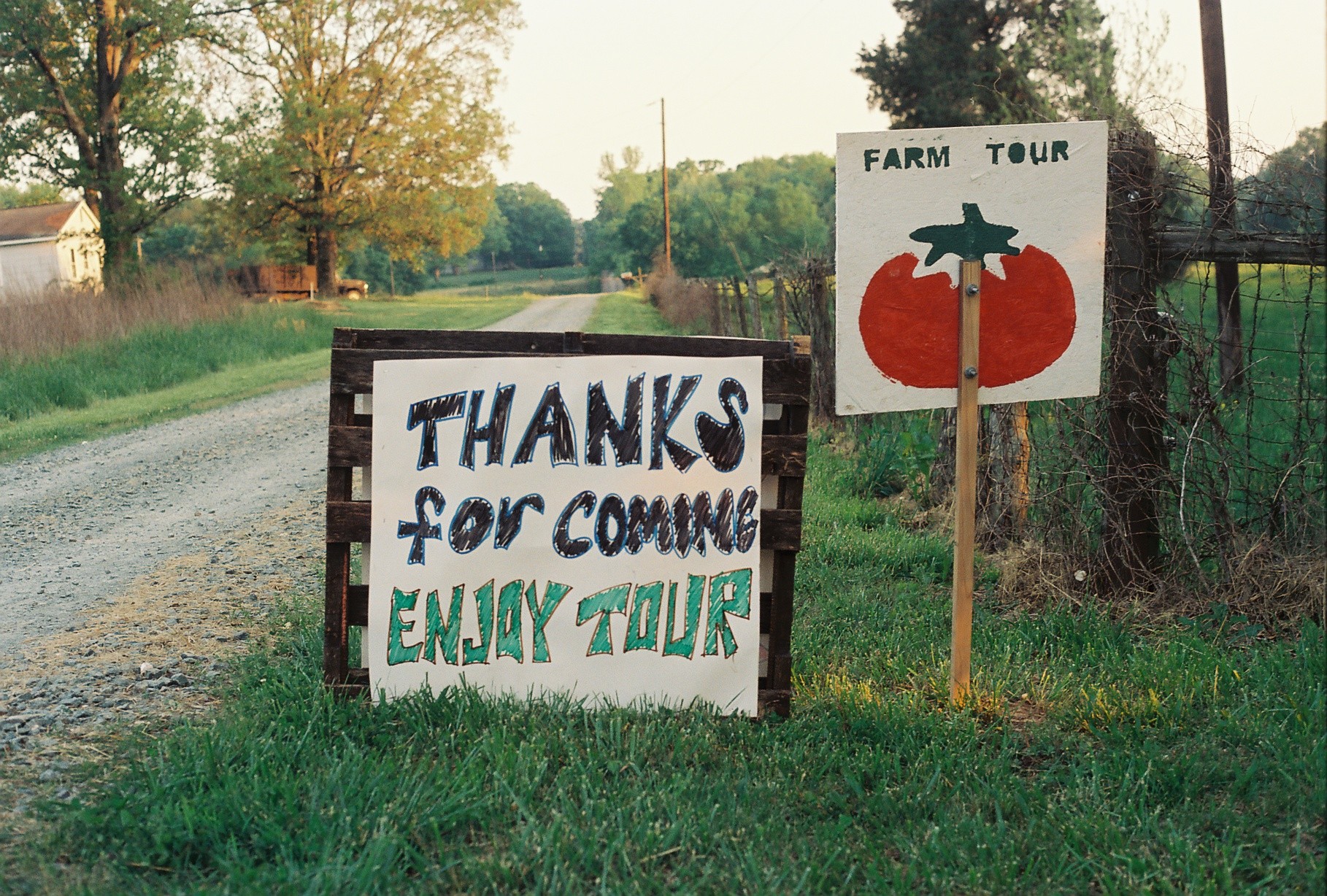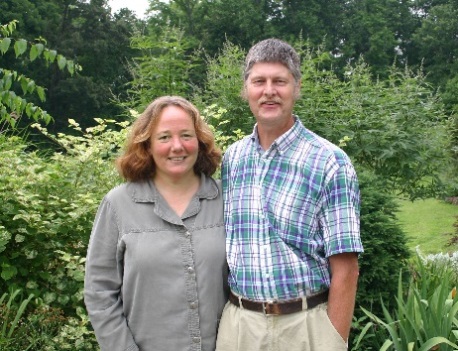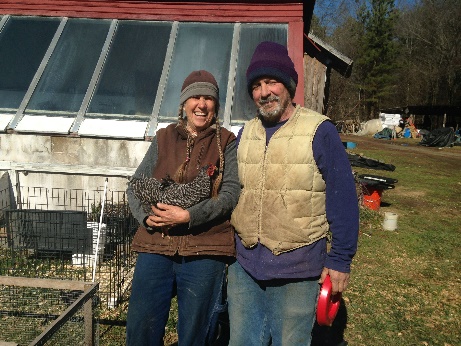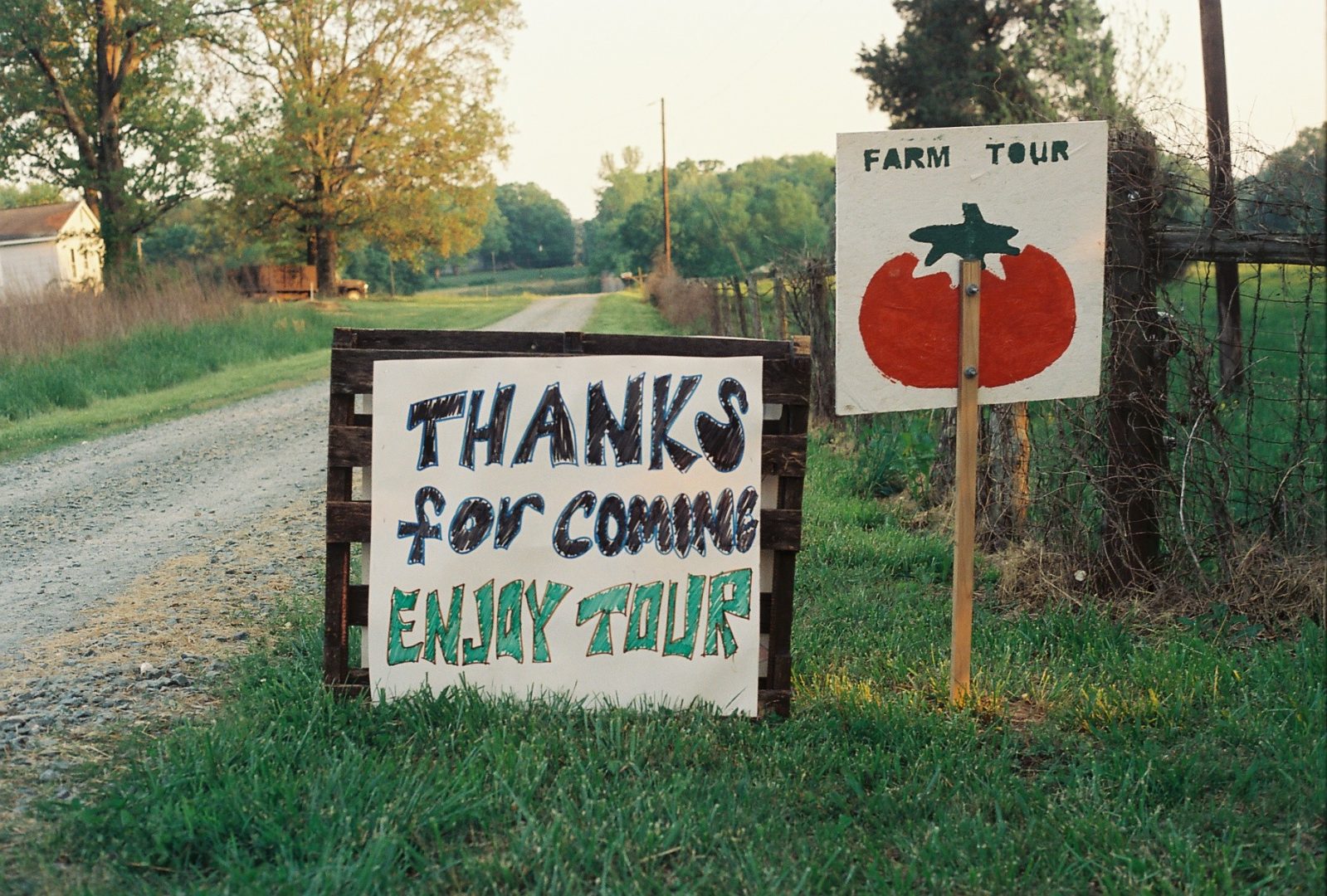by Stephanie Campbell, CFSA Outreach Coordinator | Apr. 7, 2015 –

The first Piedmont Farm Tour in 1996
Twenty years ago, Betsy Hitt of Peregrine Farm in Graham, North Carolina, had an idea that continues to bear fruit today.
She had heard about an open studio artist tour and thought a farm tour would be a great fundraiser for CFSA. After the very first CFSA Fundraising Committee meeting, Betsy walked across the street to ask Linda Fullwood if Weaver Street Market, a cooperative grocery store in Carrboro, NC, would co-sponsor the farm tour. With Linda’s enthusiastic “yes!” Weaver Street was on board as a partner, and the Piedmont Farm Tour was born.
In 1996, the sustainable farming community in the Triangle region of North Carolina was a tight group of friends who often shared potluck dinners and cared about each other’s successes. Betsy turned to these friends for help and asked them to open their farms to visitors on the first tour.
In 1996, the sustainable farming community in the Triangle region of North Carolina was a tight group of friends who often shared potluck dinners and cared about each other’s successes.
One of those friends, Cathy Jones of Perry-winkle Farm, has served on the Piedmont Farm Tour Committee every year since then. Cathy said she “felt so honored to be included since our farm was small and only in its sixth season.”
The tradition of close friendships, with established farms welcoming and mentoring aspiring farmers and curious shoppers, continues today and has helped make the Piedmont region ground zero for the local, organic food revolution and the Piedmont Farm Tour the largest tour of its kind in the United States.
Lessons from the Early Years
Organizers chose the last weekend in April to build on a small Earth Day celebration that Weaver Street Market hosted at the time. Mike Perry, Cathy’s husband, pointed out that this is a good time for guests to come to the farm: before weeds germinate and the grass needs mowing!
Cathy remembers how nervous they were that hundreds of people could come to see their farm, but it was even more nerve-wracking to consider the alternative: What if no one came?
Betsy echoed Cathy’s concern, “imagine calling up your farming friends and asking them to take a leap of faith, to get their farm ready for guests, and set aside a whole weekend with no guarantees.”
Luckily, the first year was far more successful than they anticipated. Nearly 500 people visited the 14 farms on tour.
A sign with a shiny red tomato has marked farm locations on the tour from the very beginning. Volunteers painted plywood signs with a stencil of the signature red tomato.
Betsy remembers driving all over the map to each farm with signs and supplies, practically “throwing” them at each farm to get to every farm in one day. The best-laid plans, as they say, often go awry: with the handmade signs installed on the roads, “people drove into the farms looking for strawberries,” Betsy laughed.
Weaver Street Market has been an essential partner in building the Piedmont Farm Tour into a regional institution. “We couldn’t ask for a better co-sponsor than Weaver Street,” said Laura Stewart, CFSA Education Director. “They have been so generous to us and to the farmers on the tour, and Linda Fullwood has been central to the success of the tours these last 20 years.”
Local Food Scene
In the early years, most of the tour-goers were customers of Weaver Street Market and the Carrboro Farmers Market who wanted to see how their food was grown.
The tour still enables farmers to develop relationships with loyal customers while also offering opportunities to engage with new customers, educate folks about sustainable and organic farming practices, provide hands-on lessons for beginning farmers and gardeners, and introduce children to where their food comes from.
In the past 20 years of the Piedmont Farm Tour, both Perry-winkle and Peregrine farmers say they have seen a significant, positive change in the public’s attitude, understanding and support of the sustainable farming movement.
They see an encouraging convergence of interest from those who care about the environment, foodies interested in the freshest and tastiest foods, parents who care about their children’s health, and people who want to build a strong, local economy.
Farm tours highlight the resources available in our region and show our community how sustainable agriculture is good for consumers, good for farmers and farmworkers, and good for the land. Opening the farm gates and inviting people in is one of the best ways for farmers and consumers to get to know each other and work together.
Opening the farm gates and inviting people in is one of the best ways for farmers and consumers to get to know each other and work together.
CFSA thanks Weaver Street Market, Peregrine Farm, and Perry-winkle Farms (see below) for their continuing leadership in sustainable farming and the Piedmont Farm Tour.
Peregrine Farm
Betsy and Alex Hitt
Graham, NC

Peregrine was established in 1981 on 26 acres with about four acres in production. Betsy and Alex are committed to farming practices that protect natural resources, and they have tirelessly shared their tried-and-tested experience with other farmers.
Above all, their fertility plan emphasizes detailed rotations and green manure crops to keep nutrients in the soil.
Alex is in charge of the vegetable production and is a pepper and heirloom tomato expert. Betsy is a pioneer in cut flowers. Their emphasis on soil health, long-term production cycles, market knowledge, and systems planning has created an economically successful and sustainable farm. Betsy and Alex sell 150 varieties of 36 vegetables and an equal variety of flowers at the Carrboro Farmers’ Market, Weaver Street Market, and to many local restaurants.
Perry-winkle Farm
Cathy Jones and Mike Perry
Chapel Hill, NC

Perry-winkle was established in 1991 on 33 acres, with over six acres in field production and pastures.
Diversity is both a valuable tool and a management challenge at the farm. Quarter-acre and half-acre blocks are planted with different crops and are rotated following a five-year rotational plan; flowers alternate with vegetables, herbs, and cover crops. Such intense diversity enhances the effectiveness of beneficial insects and keeps a check on diseases.
Cathy and Mike integrated pastured poultry onto their farm in 2002. The laying hens help control insect pests and weeds and provide valuable nutrients for crops. Cathy and Mike sell broilers and eggs from free-range chickens, more than 50 different varieties of seasonal vegetables and cut flowers at the Carrboro and Fearrington farmers markets.


